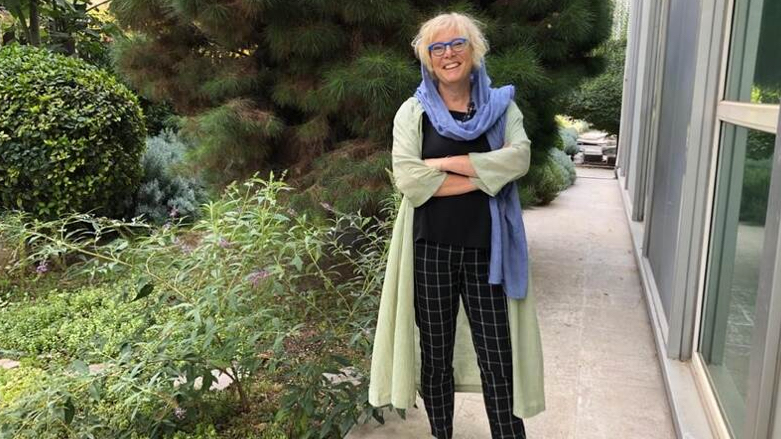New joint KRG-Dutch agriculture policy paper to be published soon
"We try to promote trade ties between the Netherlands and Iraq on the level of agriculture."

ERBIL (Kurdistan 24) – The Dutch Agricultural Counselor for Iraq and Iran Marion Van Schaik told Kurdistan 24 that a new agricultural policy paper for 2022-2026 will soon be published jointly by the Kurdistan Regional Government's Ministry of Agriculture and the government of the Netherlands.
Van Schaik's job is to promote agricultural trade and exchange knowledge between Iraq, including the Kurdistan Region, and the Netherlands. She has already made several visits to the Kurdistan Region, including to the provinces of Duhok, Halabja, Sulaimani, and Erbil.
"Together with local advisor Hoshang Hamad we form an agricultural team (for the Netherlands Embassy and Consulate), and we try to promote trade ties between the Netherlands and Iraq in the area of sustainable agriculture," she said.
"We also try to exchange knowledge about agriculture."

Read More: Netherlands pledges continued key support for Kurdistan Region agriculture
Last year, the Kurdistan Region and the Netherlands signed a memorandum of understanding (MoU) that aims to contribute to creating and implementing an overarching strategy for the sustainable economic development of the latter's agricultural sector.
This includes the creation of a joint Kurdish-Dutch advisory committee to give advice on agricultural policies and their implementation to boost the autonomous region's agro and food sector. The aim is for the Kurdistan Region to produce more fruit and vegetables for their own market instead of importing expensive and lower-quality products from abroad.
"Why import expensive and less fresh vegetables from other countries, while you have good soils and experienced farmers to produce it yourself? With the support of the Netherlands, steps can be made to have fresher, cheaper, and better products that fit the demand of the local market," Van Schaik said.
For this reason, the government of the Netherlands assigned three Dutch experts for a period of 12 months to join the Joint Advisory committee to provide support and advice to their counterparts in the KRG Ministry of Agriculture.
"We met with different actors, the advisory committee organized roundtables and discussed the most important challenges and priorities," Van Schaik said.
"We have a project here with consultants that work together with experts of the Ministry of Agriculture," she said. "Soon, we will have a policy advice report, focussing on the challenges and priorities in the agricultural sector of the Kurdistan Region."
"Later, we should look at what we will do with the recommendations and take steps. But this is all in coordination (with the KRG Ministry of Agriculture)."
Read More: Drought ravages this year's wheat harvest in Kurdistan Region
During her field trips, Van Schaik observed how climate change and droughts affect the Kurdistan Region's farmers.
"There have been droughts in the last few years. Climate change will put a mark on Iraq and nature," she said. "The expectation is that the climate will become even drier and that this will affect agriculture. We have noticed this in all conversations with Kurdish farmers."
"Some farmers say they have water wells, and if you ask further, they indicate they have to drill deeper and deeper to gain access to water," she added.
Therefore, the Dutch want to exchange knowledge on how to farm using fewer water resources.
"We are looking for sectors in which water usage can be reduced. For instance, greenhouses are more water-efficient than growing crops in the open air. You can also recycle water," Van Schaik said. "Moreover, ten Dutch companies also participated in last year's Agro Pack conference. It was our first (agricultural) fair here."
Read More: Dutch agro networking event in Erbil promotes Kurdistan Region private sector
"The ten companies built a good new network and gained some promising prospects during the fair," she added. "We are satisfied with this result, and we hope for the next Agro Pack there will be even more interest."
She underlined that the Kurdistan Region's horticultural sector is promising.
"This is one of the sectors that is promising for the Kurdistan Region," she said. "This is also a natural domestic market, and for the Netherlands, this is interesting as we can exchange knowledge and promote innovations."
Moreover, she said the potato sector in the Kurdistan Region is developing well. Several Kurdish investors have invested in potato farming and processing.
Last month, the Dutch Minister of Foreign Trade and Development Liesje Schreinemacher also visited the Kurdistan-Holland (K-H) Company for Agricultural Investments in Rovia. The company plays a significant role in potato farming.
A great visit of Dutch Minister of Foreign Trade and Development Cooperation was made to a Potato Farm in Rovia where she met KRG Minister of Agriculture. Strengthening the cooperation of agriculture sector between NL and KRI has been discussed. pic.twitter.com/W5pi2y02fA
— NL-Irak Agri (@AgroIrak) May 2, 2022
Read More: Kurdish company owner says Dutch-Kurdish cooperation helps Kurdistan's agricultural sector
The dairy sector is another sector where the Netherlands is being approached for its quality inputs and its knowledge. One of the challenges the Kurdistan Region faces is that Kurdish livestock farmers rely on traditional knowledge regarding feed and management and that quality inputs are difficult to access.
"It is interesting to see that new investors are stepping into the agricultural sector and are open to innovation," she said.
"These sectors can be further developed with new technologies, quality inputs to, for instance, prevent diseases, and by bringing producers and buyers together," she concluded.